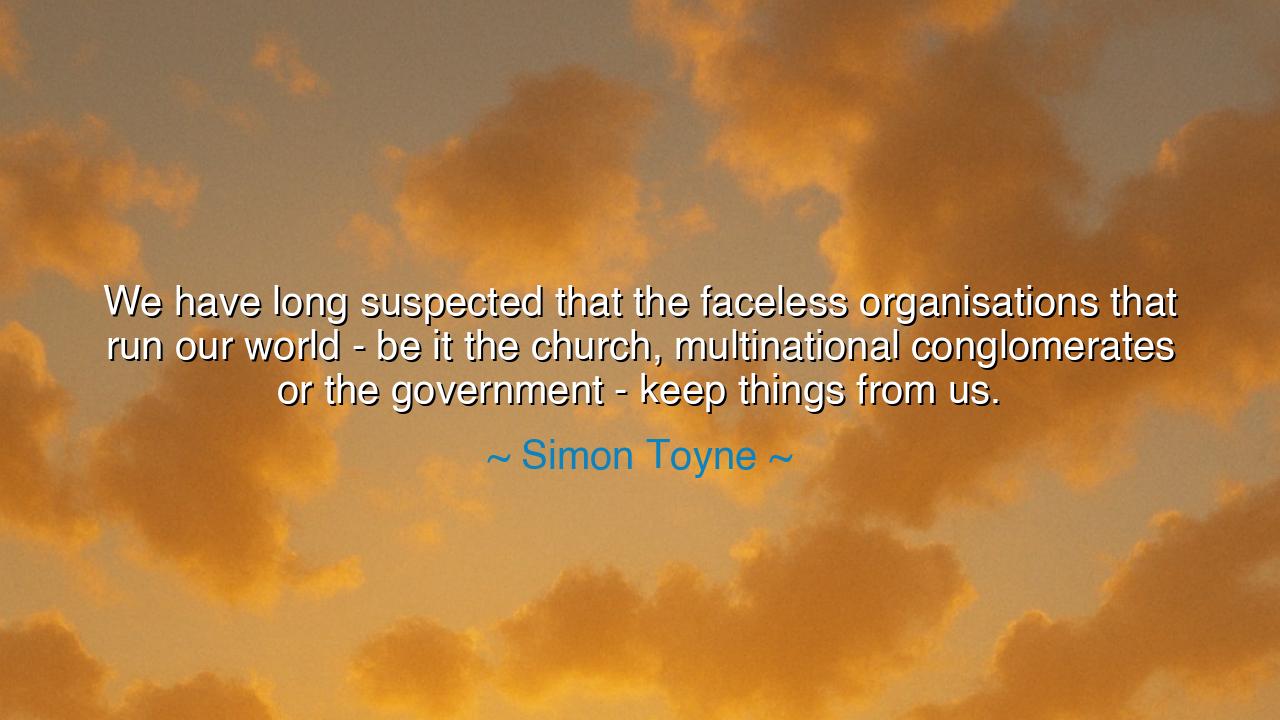
We have long suspected that the faceless organisations that run
We have long suspected that the faceless organisations that run our world - be it the church, multinational conglomerates or the government - keep things from us.






When Simon Toyne declared, “We have long suspected that the faceless organisations that run our world — be it the church, multinational conglomerates or the government — keep things from us,” he was giving voice to a timeless human intuition — that behind the veil of authority lies hidden knowledge, guarded not for the people’s safety, but for the preservation of power. His words are not merely cynical; they are prophetic, echoing an ancient truth: that secrecy has always been the cloak of control. Toyne, a novelist known for exploring mysteries of faith, power, and conspiracy, captured in this single line the enduring tension between truth and authority, between the governed and those who govern, between what is seen and what is concealed.
The origin of this quote lies not in political speech but in the realm of literature — in Toyne’s exploration of myth and modernity. Through his novels, he examines humanity’s hunger for meaning in a world dominated by impersonal systems. His words speak to the modern age, where the faces of rulers are hidden behind algorithms, bureaucracies, and financial networks — entities too vast to touch, too abstract to hold accountable. Yet the spirit of his message reaches far beyond the present age. From the empires of old to the digital realms of today, those who hold power have always built walls of secrecy around themselves, for knowledge is the root of influence, and control over knowledge is control over humanity itself.
In the style of the ancients, we may say that Toyne’s warning is the whisper of Prometheus to mankind — that light must be stolen from the gods, for the gods will never freely share it. The institutions he names — church, corporations, government — are the modern pantheon, entities that promise protection and order but often guard their mysteries like jealous deities. Throughout history, we have seen how power thrives in the shadows. The Church of the Middle Ages shrouded Scripture in Latin, accessible only to priests, keeping the laity dependent on its interpretation of divine will. The rulers of empires cloaked their politics in divine right, and in our own time, governments justify secrecy under the banner of “security.” Thus, the faceless organisations Toyne speaks of are not a new creation — they are the eternal shape of human ambition when unrestrained by truth.
Consider the story of Galileo Galilei, who dared to unveil one of those hidden truths. When he looked through his telescope and declared that the Earth revolved around the sun, he was not merely describing astronomy; he was challenging the secrecy of authority. The Church of his day feared that such knowledge would upend its control over human thought. Galileo was condemned, silenced, and confined — not because his discovery was false, but because it was dangerous. In his fate, we see Toyne’s warning embodied: when power feels threatened by truth, it does not correct — it conceals.
Yet Toyne’s quote is not a cry of despair; it is a call to awareness. His words remind us that suspicion — the healthy kind — is the guardian of liberty. For those who blindly trust the “faceless organisations” to act in their interest become as sheep before the silent wolf. The antidote to deception is not hatred but illumination — the constant pursuit of knowledge, the courage to question, the discipline to seek truth even when it is uncomfortable. Power will always seek to hide its hand; it is the duty of the free mind to lift the veil.
In his insight lies a moral warning: that when societies grow complacent, they become easy to rule. When citizens surrender their curiosity, they surrender their sovereignty. Every age must rekindle the sacred flame of inquiry — in its schools, its press, and its people — for when the light of questioning dims, tyranny takes form not as a man, but as a system. To question authority is not rebellion; it is the highest act of loyalty to truth and to the human spirit.
The lesson of Simon Toyne’s words is therefore clear and enduring: seek truth beyond the mask of power. Do not assume that the loudest voice speaks for justice, nor that the largest institution acts for good. Look deeper. Read widely. Ask relentlessly. Every generation must choose whether to live as observers of the world’s deceptions or as participants in the uncovering of its truths. The church, the corporation, the government — all are human creations, fallible and prone to corruption. But the truth — the living, breathing truth — belongs to no one. It is the inheritance of the brave.
So remember this, children of the future: the faceless can only rule when the courageous become voiceless. Lift your eyes from the shadow and seek the light behind it. Question with integrity, learn without fear, and never trade curiosity for comfort. For in a world of secrets, truth itself is an act of rebellion, and to love the truth — fiercely, steadfastly, fearlessly — is the noblest rebellion of all.






AAdministratorAdministrator
Welcome, honored guests. Please leave a comment, we will respond soon